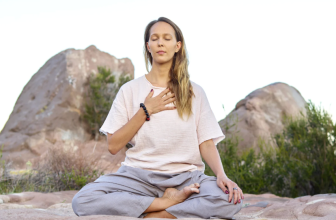
It is important to be able to trust your intuition, but many of us have forgotten how to recognize when this natural instinct is calling. Intuition acts as a guide to help us make decisions instinctually without conscious reasoning. When we make choices instinctually it is based on a deep sense of knowing it is the right choice. This is because we are acting from our true nature, living aligned with our true selves instead of looking for answers or gratification externally.
Intuition
Scientifically speaking, intuition is about pattern matching. The moment we are born, the brain starts identifying patterns in the current environment and matches them with experiences from the past. The patterns are stored at the cellular level and when something arises to trigger these patterns our body knows instinctually how to appropriately respond. Over time, we forget how to trust this feeling. Life drowns it out as we get caught up in analyzing and attempting to control situations so we get the outcome we desire. We forget to listen to this voice that is inside each of us.
In a world filled with distractions, we become convinced the answers come from outside ourselves. We turn to other people, social media, and even television instead of trusting what is within. Gradually, this dulls our intuition and we forget how to tune into it. When we ignore the intuition, we end up living with regret and making poor choices because we believe we knew better. When we are children, this intuition comes naturally and we have no need to question it. We simply act and if something feels good, we do it because we trust ourselves completely. These instincts fade over time and outward answers are sought, but the intuition does not really disappear, we just learn to ignore it. It is possible to learn to trust it once again.
How Trusting Your Intuition Feels
When we lose touch with our instinctual selves, it can lead to pain and suffering. We end up making decisions based on the needs of others and sacrificing personal happiness. This leaves us in a vicious cycle that ends in losing a self of self. We may know that deep down the choices are not aligned with the true self and that we have forgotten how to tune into the wisdom that is inside. We may end up longing for a connection even if we do not understand it on the conscious level.
Intuition comes from a memory of past patterns and acts as a guide. It presents itself in subtle ways so we must really pay attention to tune in and allow it to guide us. It takes time and effort to strengthen this connection to our intuition, but with practice it is possible to become realigned.
Forms of Intuition
Intuition comes in several forms. The five most common are shared below:
- Messages – Tune in and listen to your inner voice instead of immediately reacting. Intuition gives us constant massages, but we must pay attention. This requires quieting the mind and trusting the message, even if it does not make sense in the moment.
- Trust Your Gut – The gut is connected by neural transmitters that trigger intuitive responses. Pay attention to those feeling that arise in your gut when you need to make a decision and make the decision based on them.
- Visions/Memories – Due to pattern matching, some people have visions or memories as part of intuition. Certain people or situations may be triggers to the past and intuition arises.
- Knowing/Signs – If similar patterns keep appearing in your life, your intuition may be trying to communicate. You are being pushed in a certain direction so pay attention.
- Dreams – Intuition may let itself be known in dreams. When we dream, our thoughts are not filtered by the rational mind so intuition can take over. Our dreams hold important messages that may not make sense at first, but we can still learn a great deal. Keep a dream journal and look for recurring messages to gain a fuller picture.
The more you practice with intuition, the clearer the messages will become. It is a powerful and transformative tool that aligns with our essence. Allow it to be heard and connect with the self.






‘Trusting Your Intuition’ encapsulates a profound truth; aligning one’s choices with inner wisdom fosters authenticity in life decisions. This alignment can lead not only to personal satisfaction but also broader societal benefits.
The cyclical nature of this process—whereby one must first lose touch before rediscovering their intuitive self—is quite enlightening, suggesting an intrinsic journey toward self-awareness that many might overlook.
Cultivating awareness around ‘gut feelings’ could indeed enhance decision-making capacities significantly—an aspect frequently undervalued in rational discourse surrounding choices and consequences.
‘Knowing/Signs’ presents an interesting paradigm where repeated patterns are seen as intuitive signals. This perspective encourages us to reflect on our experiences more holistically rather than dismissing them as mere coincidences.
The emphasis on quieting the mind to reconnect with intuition resonates deeply with me. In a world saturated with information, cultivating moments of silence seems imperative for clarity and self-alignment.
Overall, this piece offers profound insights into reclaiming one’s intuitive abilities through practice and reflection—an endeavor that holds promise not just for individual growth but also for collective understanding.
Reconnecting with one’s instinctual self can potentially revolutionize how we approach challenges in both personal and professional realms—a notion worth pursuing further in contemporary discussions on mental well-being.
‘Messages’ from within indeed require attentive listening—a skill that many have neglected in favor of constant distraction. This article serves as a poignant reminder of what we stand to gain by tuning into ourselves.
The intersection between intuition and cognitive patterns is particularly intriguing. The piece captures the essence of how we must cultivate our innate abilities rather than relying solely on external validation or influence.
Indeed, the decline in intuitive trust signifies a broader societal trend towards external reliance, which may be detrimental to personal fulfillment and well-being. Understanding this dynamic can lead to profound personal insights.
I find the discussion about dreams as vessels for intuition particularly compelling. Our subconscious often communicates vital truths that are obscured during waking hours, highlighting the need for conscious engagement with our dreams.
‘Messages’ as a form of intuition is a concept worth exploring further. Perhaps incorporating mindfulness techniques could enhance our ability to decipher these subtle cues from within.
‘Trust Your Gut’ serves as a reminder of the physical embodiment of our instincts. It would be beneficial to further investigate the neurological connections between gut feelings and cognitive reasoning.
This article elucidates the often-overlooked concept of intuition, presenting it as an innate skill that requires nurturing. It is fascinating how our modern lives can obscure such fundamental aspects of our decision-making processes.